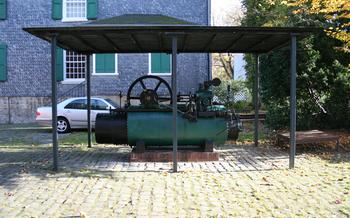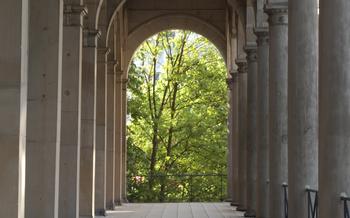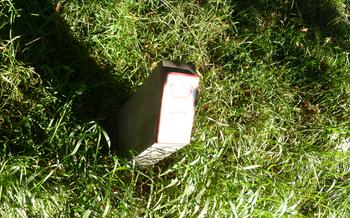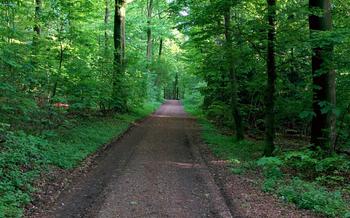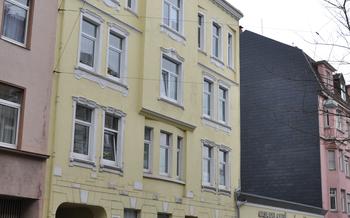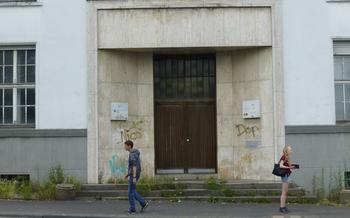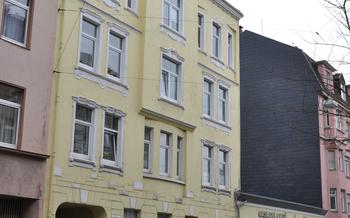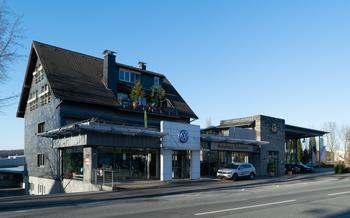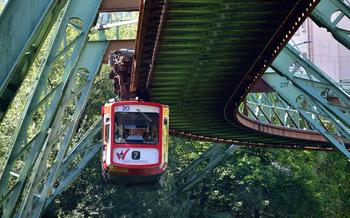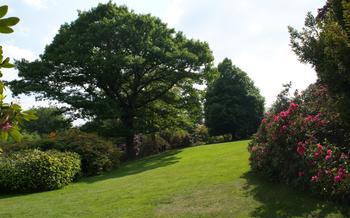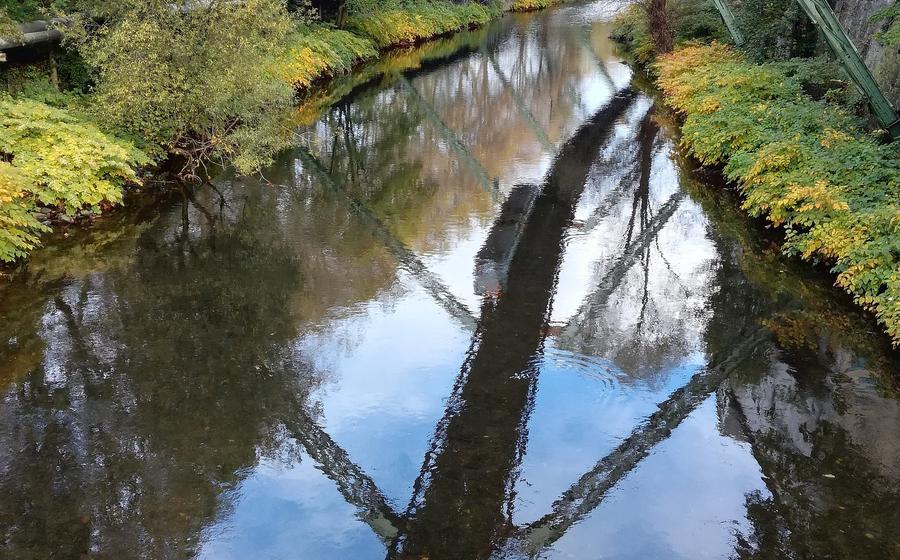
Gelber Sprung (Yellow Jump)
- The Gelber Sprung (Yellow Jump), Wuppertal's Unique Suspension Railway
- Schwebebahn Museum (Suspension Railway Museum)
- Wuppertal Zoo: A Thriving Haven for Wildlife and Conservation
- Von der Heydt Museum: A Treasure Trove of Art and Cultural Heritage
- Junior Uni Wuppertal: Inspiring Young Minds Through Interactive Science
- Wuppertal Institute for Climate, Environment, and Energy
- Wuppertal Opera House: A Cultural Landmark for Music Lovers
- Skulpturenpark Waldfrieden (Sculpture Park Waldfrieden)
- Korkenziehertrasse (Corkscrew Viaduct): Marvel of Engineering and Architecture
- Briller Viertel (Glasses Quarter)
- Wuppertal's Culinary Scene
- Shopping in Wuppertal
- Insider Tip: Wuppertal Card
The Gelber Sprung (Yellow Jump), Wuppertal's Unique Suspension Railway
The Gelber Sprung, or Yellow Jump, is an iconic landmark and a symbol of Wuppertal. This unique suspension railway system has been in operation since 1901 and is a marvel of engineering. The Schwebebahn, as it is locally known, runs through the city center, offering breathtaking views of the Wupper River, the surrounding hills, and the city's rooftops. The elevated railway provides a unique perspective and an unforgettable experience of traveling above the hustle and bustle of the city. The Gelber Sprung is not just a means of transportation but also a symbol of Wuppertal's industrial heritage and a testament to the ingenuity of its engineers.
Schwebebahn Museum (Suspension Railway Museum)
The Schwebebahn Museum, located in Wuppertal, Germany, is a fascinating destination for anyone interested in the history and technology of the city's iconic suspension railway. Immerse yourself in the world of the Schwebebahn through interactive displays, model railways, and guided tours.
The museum showcases the engineering marvel that is the Wuppertal Suspension Railway, providing insights into its construction, operation, and significance. Explore the history of this unique transportation system, from its early beginnings to its modern-day operations.
Learn about the engineering challenges that were overcome in building the suspension railway, including the development of specialized vehicles and the construction of the elevated tracks. Discover how the Schwebebahn has shaped the city of Wuppertal, becoming an integral part of its identity and a symbol of innovation.
Take advantage of the guided tours offered by the museum to gain an insider's perspective on the Schwebebahn system. Experienced guides will take you behind the scenes, allowing you to see the inner workings of the railway and learn about its maintenance and operation.
The Schwebebahn Museum is a must-visit for anyone interested in transportation history, engineering, or simply the unique charm of Wuppertal. It offers a comprehensive and engaging exploration of the city's iconic suspension railway, providing a deeper understanding of its significance and impact on the urban landscape.
Wuppertal Zoo: A Thriving Haven for Wildlife and Conservation
Wuppertal Zoo, a sprawling sanctuary nestled amidst the vibrant city of Wuppertal, is a haven for over 5,000 animals from around the world. With its diverse collection of species, educational exhibits, and interactive experiences, the zoo offers a unique opportunity to connect with the wonders of the natural world and foster a deeper appreciation for wildlife conservation.
As visitors step into the zoo's expansive grounds, they are greeted by a symphony of sounds and sights, from the playful chatter of monkeys to the majestic roars of big cats. The zoo's spacious enclosures, designed to mimic the animals' natural habitats, provide a comfortable and stimulating environment for the inhabitants. Visitors can observe the graceful movements of giraffes as they roam freely in their savanna-like enclosure, marvel at the antics of mischievous meerkats, and witness the fascinating underwater world of penguins and seals in the zoo's state-of-the-art aquarium.
Beyond animal encounters, Wuppertal Zoo is dedicated to promoting conservation efforts and educating visitors about the importance of protecting our planet's biodiversity. Interactive exhibits and educational programs shed light on the threats facing endangered species and the crucial role of conservation in preserving the delicate balance of our ecosystems. Visitors can learn about the zoo's conservation initiatives, such as breeding programs for endangered species and collaborations with wildlife protection organizations around the world.
A visit to Wuppertal Zoo is not just an opportunity to see exotic animals up close; it is a journey of discovery, inspiration, and conservation awareness. As visitors leave the zoo, they carry with them a newfound appreciation for the beauty and diversity of the natural world, and a commitment to protecting the planet's precious wildlife for generations to come.
Von der Heydt Museum: A Treasure Trove of Art and Cultural Heritage
Wuppertal's cultural heritage shines brightly at the Von der Heydt Museum, a treasure trove of art from across the ages. Immerse yourself in an extensive collection of paintings, sculptures, and decorative arts, spanning from medieval masterpieces to contemporary creations.
The museum's walls are adorned with works by renowned artists, including Monet, Renoir, and Rodin, inviting you on a journey through the history of art. Explore diverse artistic styles, techniques, and subjects, gaining insights into the creative minds that shaped the art world.
Special exhibitions and events throughout the year add a dynamic element to the museum experience. Delve into specific themes, discover emerging artists, and engage in thought-provoking discussions on art and culture.
The Von der Heydt Museum is not just a repository of art; it's a place where art comes alive. Immerse yourself in the stories behind the masterpieces, appreciate the intricate details, and feel the emotions conveyed through each brushstroke and sculpture.
Junior Uni Wuppertal: Inspiring Young Minds Through Interactive Science
Junior Uni Wuppertal is an extraordinary interactive science center designed to ignite curiosity and foster a love for learning in young minds. This vibrant space is dedicated to providing children and families with an immersive and hands-on experience in the realm of science.
Junior Uni Wuppertal offers an array of interactive exhibits and experiments that cover a diverse range of scientific topics, from physics and chemistry to biology and environmental studies. These engaging displays allow children to explore scientific concepts in a fun and interactive manner, encouraging them to ask questions, experiment, and discover the wonders of the natural world.
In addition to its interactive exhibits, Junior Uni Wuppertal also hosts workshops, science shows, and educational programs throughout the year. These events provide children with the opportunity to delve deeper into specific scientific topics, meet with experts, and participate in hands-on activities that further enhance their understanding and appreciation for science.
Junior Uni Wuppertal is not just a place for learning; it is also a place for fun and exploration. With its engaging exhibits, interactive programs, and dedicated staff, this science center creates a stimulating environment where children can unleash their curiosity, develop their critical thinking skills, and discover the joy of scientific exploration.
Whether you are a local resident or a visitor to Wuppertal, Junior Uni Wuppertal is a must-visit destination for families with children. It is a place where young minds can soar, imaginations can run wild, and the seeds of scientific curiosity can be planted for a lifetime of learning and discovery.
Wuppertal Institute for Climate, Environment, and Energy
The Wuppertal Institute for Climate, Environment, and Energy is a leading research and policy center dedicated to sustainability and environmental issues. Founded in 1991, the institute has gained international recognition for its pioneering work in climate change mitigation, energy efficiency, and renewable energy.
The institute's research focuses on developing innovative solutions and strategies for a sustainable future. Its interdisciplinary team of scientists, economists, and engineers collaborates closely with policymakers, businesses, and civil society organizations to address global environmental challenges.
Visitors to the Wuppertal Institute can gain valuable insights into sustainability through exhibitions, workshops, and events. The institute's interactive exhibits showcase cutting-edge research and provide hands-on experiences on various environmental topics. Guided tours offer a deeper understanding of the institute's work and its impact on sustainability policies and practices.
By engaging with the Wuppertal Institute, visitors can learn about the latest developments in sustainability research, explore innovative solutions for environmental challenges, and contribute to a more sustainable future.
Wuppertal Opera House: A Cultural Landmark for Music Lovers
Wuppertal Opera House, a historic venue nestled in the heart of the city, stands as a testament to Wuppertal's vibrant cultural scene. With its stunning architecture and exceptional acoustics, the opera house has become a beloved gathering place for music enthusiasts.
Throughout the year, the opera house hosts a diverse program of performances, ranging from grand operas and enchanting ballets to captivating classical concerts. Renowned artists and orchestras grace the stage, delivering unforgettable performances that leave audiences spellbound.
The opera house's elegant interior, adorned with intricate details and plush seating, creates an atmosphere of grandeur and exclusivity. The auditorium, with its horseshoe-shaped design and excellent sightlines, ensures that every seat offers an immersive experience.
Whether you are a seasoned opera aficionado or simply seeking a memorable evening out, the Wuppertal Opera House promises a captivating musical journey. Immerse yourself in the world of classical music as you witness breathtaking performances that will transport you to another realm.
Skulpturenpark Waldfrieden (Sculpture Park Waldfrieden)
A Tranquil Haven of Art and Nature
Nestled amidst a serene forest setting, the Skulpturenpark Waldfrieden (Sculpture Park Waldfrieden) invites visitors to a captivating journey through art and nature. This unique outdoor sculpture park showcases a remarkable collection of works by renowned artists from around the world, set against the backdrop of lush greenery and tranquil surroundings.
As you wander along the winding paths of the park, you'll encounter a diverse range of sculptures that engage in a harmonious dialogue with the natural environment. From abstract and minimalist pieces to figurative and narrative works, the sculptures offer a thought-provoking exploration of form, texture, and meaning.
The park's tranquil atmosphere provides an ideal setting for contemplation and reflection, allowing visitors to immerse themselves in the artistic expressions while surrounded by the beauty of nature. Whether you're an art enthusiast, nature lover, or simply seeking a peaceful retreat, the Skulpturenpark Waldfrieden offers an unforgettable experience that combines artistic inspiration with the serenity of the natural world.
Korkenziehertrasse (Corkscrew Viaduct): Marvel of Engineering and Architecture
In the heart of Wuppertal, a remarkable feat of engineering and architecture awaits visitors – the Korkenziehertrasse, or Corkscrew Viaduct. This unique spiral-shaped railway viaduct stands as a testament to human ingenuity and innovation.
Completed in 1903, the Corkscrew Viaduct was designed to connect the upper and lower parts of the city, overcoming the steep terrain that characterized the area. The viaduct's spiral design allowed trains to gradually ascend or descend the slope without the need for excessive gradients, making it a marvel of engineering for its time.
The viaduct consists of three spiral loops, each supported by massive stone pillars and arches. The railway tracks wind their way up the viaduct, offering passengers and visitors breathtaking views of the city and the surrounding countryside. The structure's intricate design and graceful curves create a visually striking landmark that has become a symbol of Wuppertal's industrial heritage.
Today, the Corkscrew Viaduct remains in operation, carrying both passenger and freight trains. It is a popular spot for photography and sightseeing, attracting visitors from around the world who come to marvel at this unique and iconic structure. The viaduct's enduring presence and functionality make it a remarkable example of engineering excellence and a testament to the ingenuity of its designers and builders.
Briller Viertel (Glasses Quarter)
In the heart of Wuppertal lies the Briller Viertel, a historic district renowned for its deep-rooted connection to the eyewear industry. Brimming with unique architecture and a charming atmosphere, this vibrant neighborhood invites you to delve into the fascinating world of spectacles.
Strolling along the cobblestone streets, you'll discover a treasure trove of optical museums, shops, and workshops that showcase the rich history and craftsmanship associated with eyewear making. Learn about the intricate process of creating these essential accessories, from the initial design to the final assembly.
The Briller Viertel's unique identity is reflected in its architecture, with buildings adorned with intricate details and elegant facades. Gaze upon the impressive spectacle of the historic town hall, a symbol of the district's significance and its enduring commitment to the eyewear craft.
Amidst the many optical wonders, be sure to visit the Deutsches Brillenmuseum (German Spectacles Museum), a treasure trove of eyewear history and innovation. Immerse yourself in the captivating stories behind some of the world's most iconic spectacles, from simple reading glasses to cutting-edge designer frames.
The Briller Viertel is not just a place of history and craftsmanship; it's also a vibrant hub of modern-day eyewear fashion. Renowned boutiques and independent shops line the streets, offering an array of stylish frames and sunglasses to suit every taste and preference.
Whether you're a fashion-forward individual seeking the latest trends or a history buff eager to delve into the world of optics, the Briller Viertel promises an unforgettable experience. Immerse yourself in the charm and history of this unique district, where the art of eyewear making comes alive.
Wuppertal's Culinary Scene
Wuppertal's diverse culinary scene offers a tantalizing blend of local and international flavors. From traditional German dishes to regional specialties and international cuisines, the city's restaurants and eateries cater to every taste.
Indulge in hearty German classics such as schnitzel, sausages, and potato dumplings, accompanied by a refreshing glass of beer. Explore the regional specialties of the Bergisches Land, including the famous Bergische Kaffeetafel, a delightful spread of coffee, cakes, and pastries.
For a taste of the world, Wuppertal boasts a diverse array of international restaurants. Sample authentic Italian pizzas and pastas, savor the aromatic flavors of Thai curries, or embark on a culinary journey to Japan with fresh sushi and ramen.
Immerse yourself in the vibrant restaurant scene, with options ranging from cozy cafes and traditional taverns to fine-dining establishments. Whether you're seeking a quick bite, a leisurely lunch, or a special evening out, Wuppertal's culinary offerings will not disappoint.
Don't miss the opportunity to visit the Wuppertal Market Hall, a bustling indoor market showcasing a variety of fresh produce, local delicacies, and international specialties. Engage with friendly vendors, sample local cheeses and sausages, and soak up the vibrant atmosphere.
Wuppertal's culinary scene is a testament to the city's cultural diversity and its embrace of global flavors. From traditional German fare to exotic international cuisine, there's something to satisfy every palate and create lasting culinary memories.
Shopping in Wuppertal
Wuppertal offers a delightful shopping experience with a mix of traditional and modern shopping venues. The city center boasts vibrant pedestrianized shopping streets and arcades lined with a diverse range of boutiques, department stores, and specialty shops. Whether you seek unique local handicrafts, souvenirs, or international designer brands, Wuppertal has something to offer every shopper.
Indulge in the charm of traditional German shops selling handcrafted goods, regional specialties, and antique treasures. Discover unique boutiques showcasing the latest fashion trends and local designs. For a more comprehensive shopping experience, visit the City Arkaden, a modern shopping mall housing over 80 stores, restaurants, and a cinema.
Along the Friedrich-Ebert-Straße, you'll find a variety of department stores, including Galeria Kaufhof and Karstadt, offering a wide range of products from clothing and accessories to electronics and homeware. For a more personalized shopping experience, explore the specialty shops in the Briller Viertel, where you can find unique eyewear, handmade jewelry, and vintage clothing.
Wuppertal's shopping scene is not just limited to the city center. Each district has its own unique shopping experience. Elberfeld, for instance, is known for its trendy boutiques and concept stores, while Barmen offers a mix of traditional shops and modern shopping centers.
Remember to take advantage of the Wuppertal Card, which offers discounts at selected shops and boutiques, making your shopping spree even more rewarding. Whether you're looking for souvenirs, designer clothes, or simply a leisurely shopping experience, Wuppertal has something to suit every taste and budget.
Insider Tip: Wuppertal Card
Make the Most of Your Wuppertal Experience with the Wuppertal Card
For a comprehensive and budget-friendly exploration of Wuppertal, consider purchasing the Wuppertal Card. This tourist card offers significant savings and perks, making it an indispensable companion for any traveler.
The Wuppertal Card grants free or discounted admission to a wide range of attractions, including museums, theaters, and historical sites. It also provides unlimited use of public transportation within the city, allowing you to conveniently navigate Wuppertal's various districts and landmarks.
The card is available in different durations, ranging from 24 hours to 72 hours, depending on your length of stay. Prices vary accordingly, but the longer the validity period, the more cost-effective it becomes.
To purchase the Wuppertal Card, simply visit the tourist information center or selected ticket offices. Once activated, the card can be used for the specified duration, providing you with hassle-free access to the city's attractions and transportation network.
Take advantage of the Wuppertal Card to maximize your time and budget while exploring this vibrant city. Discover the many facets of Wuppertal, from its cultural treasures to its natural wonders, all while enjoying significant savings and convenience.
